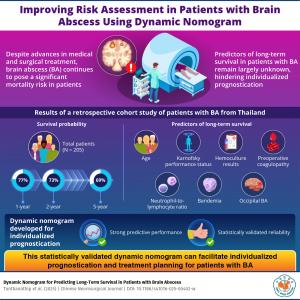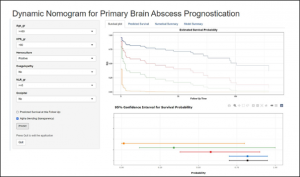Prince of Songkla University Researchers Create Predictive Model for Long-term Survivability with Brain Abscess
Researchers have created a dynamic nomogram that facilitates individualized prognostication in individuals with brain abscess
BEIJING, BEIJING, CHINA, August 20, 2025 /EINPresswire.com/ -- Brain abscess (BA) is a serious medical condition caused by localized infections in the brain. Usually, patients with BA have infection in the parenchyma—brain tissue that performs much of the organ’s vital functions. There have been significant advancements in the clinical management of BA, including medical and surgical approaches. However, the condition still leads to functional disability and mortality in patients, suggesting an urgent need to improve the standard of care.Improving the accuracy of prognostication is a crucial step in improving health outcomes of patients with BA. Although certain prognostic factors for BA have been identified, the predictors of long-term survival in patients with BA remain poorly understood. In a recent study published in Chinese Neurosurgical Journal, researchers explored predictors of long-term survival in BA patients and developed a dynamic nomogram for prognostication tailored to individuals. Further, they developed a dynamic nomogram for predicting long-term survival in patients with BA.
“This is a retrospective cohort study of individuals who had a BA that required either pathological confirmation by a pathologist or neuroimaging plus intraoperative purulent findings at a tertiary care hospital in southern Thailand between January 2014 and August 2024” explains Dr. Thara Tunthanathip, Assistant Professor at Prince of Songkla University, the lead author of the study.
The study involved a retrospective cohort analysis involving 205 patients at a tertiary care hospital in Southern Thailand. The researchers comprehensively evaluated various demographic, clinical, laboratory, and imaging factors to assess their predictive value for long-term survival in BA patients. They identified several independent predictors of long-term survival such as age, Karnofsky performance status, hemoculture results, preoperative coagulopathy, neutrophil-to-lymphocyte ratio, bandemia, and occipital location of BA. Furthermore, they estimated the 1-year, 2-year, and 5-year survival probabilities for these patients.
“The 1-year, 2-year, and 5-year survival probabilities were 0.77, 0.73, and 0.69, respectively”, notes Dr. Tunthanathip. “In the present study, the observed 5-year survival probability was 69%, indicating a case fatality rate that remains comparatively high. Prior systematic reviews and metanalyses have documented a broad spectrum of mortality rates in individuals with BA, often ranging from 10 to 40%.”
The predictors of long-term survival identified in the study hold significant potential to inform treatment decisions. The dynamic “nomogram”—a graphical tool used to predict disease progression—offers a user-friendly way of estimating long-term survival in these patients. Researchers have validated this nomogram using several distinct statistical techniques, confirming its robustness.
“The dynamic nomogram revealed strong predictive performance, with a C-index of 0.855
for apparent validation and 0.701 for validation with testing data. Calibration plots and receiver operating characteristic analysis further supported its reliability”, Dr. Tunthanathip. “The model provides an interactive tool for individualized risk assessment and facilitating clinical decision-making”, he explains further.
In the clinical setting, the predictive model created through this study may facilitate more accurate prognostication, thereby facilitating better treatment decisions and improving treatment outcomes for individuals with BA. With sufficient adaptation, the predictive model and dynamic nomogram can be applied to a wider population of BA patients.
“Future research should focus on external validation and further refinement of the model to ensure its generalizability across diverse populations”, Dr. Tunthanathip concludes.
***
Reference
Title of original paper: Dynamic nomogram for predicting long-term survival in patients with brain
Journal: Chinese Neurosurgical Journal
DOI: https://doi.org/10.1186/s41016-025-00402-w
About Prince of Songkla University
The Prince of Songkla University is the first established public university in southern Thailand. Established in 1967, it consists of 5 campuses and offers programs in various disciplines. The university also offers programs for international students, delivered through dedicated facilities and stay at Phuket campus.
Website: https://www.psu.ac.th/en/
About Dr Thara Tunthanathip from Prince of Songkla University
Dr. Thara Tunthanathip is an assistant professor at the Prince of Songkla University and a neurosurgeon at the Songklanagarind Hospital. Dr. Tunthanathip obtained his medical degree in 2007, Diplomate of the Thai Board of Neurological Surgery in 2013, and his PhD in Health Science in 2020. He has published over 96 scientific articles. Dr. Tunthanathip’s covers areas of neuro-oncology, economic evaluation, neuro-trauma, prediction research, artificial intelligence in medicine, machine learning, and deep learning.
Yi Lu
Chinese Neurosurgical Journal
+861059978478 ext.
luyi617@sina.cn
Legal Disclaimer:
EIN Presswire provides this news content "as is" without warranty of any kind. We do not accept any responsibility or liability for the accuracy, content, images, videos, licenses, completeness, legality, or reliability of the information contained in this article. If you have any complaints or copyright issues related to this article, kindly contact the author above.


